Hearts & Minds Bookstore
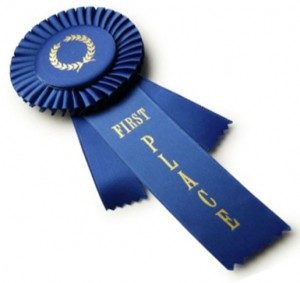
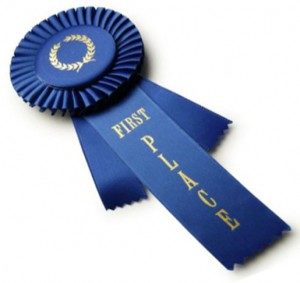 BEST BOOKS OF 2017 – PART TWO
BEST BOOKS OF 2017 – PART TWO
We hope you saw our first part of this epic list of some of the best books released in 2017. As I explained, I’m somewhat reluctant – apparently not reluctant enough, some might say – to weigh in on this, as there are so many books that are worthy in their own way. Not every great book is for every person, and, generally, people should read what makes most sense and offers help and delight to them – although it’s always good to stretch oneself a bit and dig deeply. Our Creator wants us to know the good world in which we live, and if we care about it, we will want to know not only how full of wonder it is, but the contours of its brokenness, the ways in which the wages of sin have furrowed into our lives and society. Of course, we firmly believe Jesus the resurrected Lord is bringing hope and healing “far as the curse is found” as we sang a few weeks ago, so there is theological warrant to read about everything, in hope.
Here are some of the books that gave me pleasure, hope, inspiration and hope this year of our Lord 2017. Some I have worked with considerably, others less so. I’m excited by each and every one. Kudos and cheers to authors who write and thanks to publishers and editors, sales reps and cover designers, shippers and accountants, delivery guys and folks at the USPS who keep this whole magical thing running.
You can order these easily at the website order form page. Just click on the link at the bottom and type in what you want. We’ll do the discount and confirm everything with an email back.
Or call us. We’re at your service. Thanks very much.
And, hold on, because there is a PART THREE coming where I’m going to talk about just one topic and offer a heart-felt award to one particular publisher who has offered outstanding resources in the struggle for racial justice. That final part of our BEST BOOKS OF 2017 will post before next week, I hope.
We hope you enjoy this second list of some of the titles we think deserve gold medals and big statues and bright ribbons for their work last year.
BEST BOOKS TO FUTHER THE FAITH AT WORK CONVERSATION AND MARKETPLACE MISSION
 Every Job a Parable: What Walmart Greeters, Nurses, and Astronauts Tell Us about God John Van Sloten (NavPress) $14.99 As I explained in my review of this last June when it first came out, I was utterly smitten with this book even though, early on, I wondered what more needs to be said about a Christian view of work, a Biblical view of vocation, helping people see their daily jobs as holy callings. We have written widely about that, speak about it at conferences and events, and have an intentionally curated bookstore full of Christian perspectives on business, art, education, health care, engineering, psychology, science, and more. And, happily, Van Sloten offers new insights about finding God on the job, about serving well in every possible workplace, and, how, actually, our work can teach us things about God and God’s care. As I explained, this book looks at many, may jobs and there is an index in the back showing the various insights gathering from these varying occupations. There are sermons on line, too, that John did in his church inspired by different workers in his congregation. There really is nothing quite like this and even if you’ve read a lot in their field, this is truly deserving of your time. We proclaim it one of the very best books of the year. Apparently being a work-oriented preacher is a job that can really show us God’s transforming grace, too. Well done, John Van Sloten. Thanks for doing this.
Every Job a Parable: What Walmart Greeters, Nurses, and Astronauts Tell Us about God John Van Sloten (NavPress) $14.99 As I explained in my review of this last June when it first came out, I was utterly smitten with this book even though, early on, I wondered what more needs to be said about a Christian view of work, a Biblical view of vocation, helping people see their daily jobs as holy callings. We have written widely about that, speak about it at conferences and events, and have an intentionally curated bookstore full of Christian perspectives on business, art, education, health care, engineering, psychology, science, and more. And, happily, Van Sloten offers new insights about finding God on the job, about serving well in every possible workplace, and, how, actually, our work can teach us things about God and God’s care. As I explained, this book looks at many, may jobs and there is an index in the back showing the various insights gathering from these varying occupations. There are sermons on line, too, that John did in his church inspired by different workers in his congregation. There really is nothing quite like this and even if you’ve read a lot in their field, this is truly deserving of your time. We proclaim it one of the very best books of the year. Apparently being a work-oriented preacher is a job that can really show us God’s transforming grace, too. Well done, John Van Sloten. Thanks for doing this.
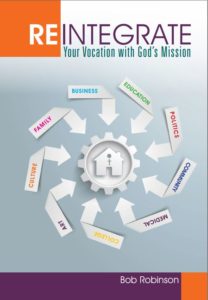 Reintegrate Your Vocation with God’s Mission Bob Robinson (Good Place Publishing) $14.00 Again, this is a book I’ve highlighted often and we helped launch its first edition in February of last year (at the big Jubilee conference in Pittsburgh.) Mid-year, a second edition came out with a fully re-worked last chapter making it even stronger. I award my good friend Bob Robinson for doing this fantastic Bible study book and honor him for his years of work inviting others into this good conversation about what whole-life discipleship looks like, particularly when one sees one’s work-world as the primary field of missional living. Three big Kingdom cheers for Reintegration Your Vocation with God’s Mission.
Reintegrate Your Vocation with God’s Mission Bob Robinson (Good Place Publishing) $14.00 Again, this is a book I’ve highlighted often and we helped launch its first edition in February of last year (at the big Jubilee conference in Pittsburgh.) Mid-year, a second edition came out with a fully re-worked last chapter making it even stronger. I award my good friend Bob Robinson for doing this fantastic Bible study book and honor him for his years of work inviting others into this good conversation about what whole-life discipleship looks like, particularly when one sees one’s work-world as the primary field of missional living. Three big Kingdom cheers for Reintegration Your Vocation with God’s Mission.
Sometimes, at the Golden Globes or Academy Awards, the same movie wins several awards. I won’t list this one again, but it surely wins another important award – best new small group resource. There are dozens upon dozens of wonderful small group studies for Bible studies and other home groups or adult classes. Reintegrate has a bit more content than many, but isn’t a full-on book. It’s a discussion guide, full of inductive questions, provocative questions to ponder, and discussion stuff. Use it on your own in your own daily devotional time or, better, invite a few folks together to work through it in community. You will be surprised how lively it is and how much you will learn.
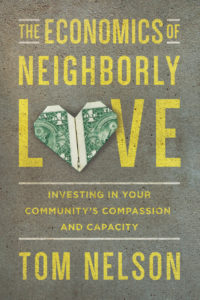 The Economics of Neighborly Love: Investing in Your Community’s Compassion and Capacity Tom Nelson (IVP) $16.00 This is another book that deserves multiple awards in several categories and one I certainly recommend heartily to any BookNotes readers who cares about the world around them. This is wonderful, wise, useful, important. A blue ribbon award winner, for sure!
The Economics of Neighborly Love: Investing in Your Community’s Compassion and Capacity Tom Nelson (IVP) $16.00 This is another book that deserves multiple awards in several categories and one I certainly recommend heartily to any BookNotes readers who cares about the world around them. This is wonderful, wise, useful, important. A blue ribbon award winner, for sure!
We firstly list this under the category of books about the world-world, in part because it is in the work-world where many of us most acutely think about economics. Further, it may be that Reverend Nelson – a good, good pastor from Kansas City – grew most deeply to care about this himself as he interacted with folks in the work-a-day world. You may know that he wrote a game-changing book about pastoral work that attends to the vocations and callings of the workers in his church. (That wonderful book is called Work Matters: Connecting Sunday Worship and Monday Work and is highly recommended as a great primer on this whole faith/work interface.)
Yet it is not exactly about work and business. It is about congregational life that involves itself in community concerns; it is about entrepreneurship, economic development, and anti-poverty work. It is about job training and fair trade and being good neighbors, even a bit about buying local and thinking about sustainability marketplace practices. It has rave, rave reviews from the likes of Amy Sherman and John Perkins and others who have made it their life’s work to help church folk care about helping their local economies flourish.
Here is how the publisher describes this books ambitious project:
What does the good news of Jesus mean for economics? Too often, Christian teaching and ministry have focused only on the gospel’s spiritual significance and ignored its physical, real-world ramifications. But loving our neighbor well has direct economic implications, and in our diverse and stratified society we need to grapple with them now more than ever. In The Economics of Neighborly Love pastor Tom Nelson sets out to address this problem. Marrying biblical study, economic theory, and practical advice, he presents a vision for church ministry that works toward the flourishing of the local community, beginning with its poorest and most marginalized members. Nelson resists oversimplification and pushes us toward more complex and nuanced understandings of wealth and poverty. If we confess the gospel of Jesus, he insists, we must contend anew with its implications for the well-being of our local communities. Together we can grow in both compassion and capacity.
Here is how our friend Steve Garber – author most recently of Visions of Vocation: Common Grace for the Common Good –writes about Tom Nelson and this recent book:
For several years I have watched this book being born, growing out of Tom Nelson’s remarkable work as a pastor in Kansas City, and increasingly as a teacher to the wider world. The Economics of Neighborly Love makes this simple argument: the everyday world is an economic world, and there are implications for who we are and how we live. Drawing on years of pastoral experience with people at work in the world, social analysis from across the political spectrum, relationships with good people doing good work in cities all over America, and most profoundly a commitment to biblical and theological reflection, this is a book for everyone who cares about the moral meaning of the marketplace.
Agree or not with all of Nelson’s proposals, we simply must agree with Tim Keller who says, simply, it is “a great contribution.” Award winning, I’d say.
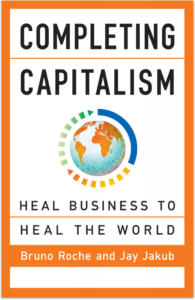 Completing Capitalism: Heal Business to Heal the World Bruno Roche and Jay Jakub (Berrett Koehler) $19.95 I hope you read carefully that quote by Steve Garber, above, celebrating Tom Nelson’s book, The Economics of Neighborly Love. Garber is a person I trust more than almost anyone and it is interesting that he so appreciates that overtly evangelical and Biblical book by Nelson. Because he was also involved in a several hear study team that produced this book. It was also created by people of profound Biblical faith but the book is pitched into the mainstream world of corporations and big businesses and therefore has a more complex tone and offers more specialized proposals. I was thrilled to tell you about it earlier this year and I continue to rejoice that such good work was funded (in part by the Mars Corporation – yep, the M&M folks.) I think it is extraordinary and we are glad to honor it as one of the best business/economics books of many a year.
Completing Capitalism: Heal Business to Heal the World Bruno Roche and Jay Jakub (Berrett Koehler) $19.95 I hope you read carefully that quote by Steve Garber, above, celebrating Tom Nelson’s book, The Economics of Neighborly Love. Garber is a person I trust more than almost anyone and it is interesting that he so appreciates that overtly evangelical and Biblical book by Nelson. Because he was also involved in a several hear study team that produced this book. It was also created by people of profound Biblical faith but the book is pitched into the mainstream world of corporations and big businesses and therefore has a more complex tone and offers more specialized proposals. I was thrilled to tell you about it earlier this year and I continue to rejoice that such good work was funded (in part by the Mars Corporation – yep, the M&M folks.) I think it is extraordinary and we are glad to honor it as one of the best business/economics books of many a year.
Here is some of what I wrote last May in BookNotes:
Completing Capitalism just released and we couldn’t be more eager to have you know about it. Maybe the best way to introduce BookNotes readers to it is to remind you of some of the stories my friend Steve Garber tells in his extraordinary book Visions of Vocation about his work as a fellow on a team working with the Mars Corporation – yes, the family-owned candy company – helping them think through the world of work in that company, the character of modern day agriculture, the nature of business ethics, the vision that might underpin a new way of thinking about profit and corporate sustainability, the integral aspect of social responsibility of the corporation. These two authors – who are respected in high level economic circles, especially in Europe – have forged a manifesto of sorts that takes issue with a singular view of profit-making, insisting that the task and calling of a business, and the rubrics that measure its success, simply has to be about more than money-making. They are not the first or only economists calling for a more multi-dimensional definition of business success but this book is nonetheless very significant, fleshing out, as it does, what this might look like, even in a corporation like Mars, Inc.
You probably know the unchristian insight of free market guru Milton Friedman who wrote about how greed should, indeed, be our guide in business and how any notion whatsoever of social responsibility for a business (other than making money) is anathema. (That some Christian colleges and think-tanks teach this unbiblical nonsense is beyond me.) You may know the famous line written by the more liberal John Maynard Keynes about how “avarice must be our god a little longer still” as he advised us to continue our admittedly sinful economic ways. Keynes perhaps didn’t think this sort of arrangement was best, but he felt like we needed to continue to serve those false gods. This obsessive focus on a reductionistic view of the role of profit was a major cause of the abuses that nearly sunk the global economy in 2008, was it not?
Completing Capitalism attempts to re-frame the conversation about what a business is, what meaningful work is, what profit is, what the marketplace is, and how to measure the outcomes of a faithful, sustainable, truly successful business. This line of thought is a true gift.
Here’s what the always eloquent and wise Steve Garber says about it:
As human beings we long for the way the world is supposed to be, even as we make choices against that hope. For years Bruno Roche and Jay Jakub have been hard at work thinking and rethinking the way that business should be and ought to be–if we are to flourish as selves and societies, choosing a future that understands the grain of the universe. With a rare willingness to ask the most critical questions about the nature of business, their ‘economics of mutuality’ is a vision for doing good and doing well in the context of one of the most iconic brands in the modern world. Neither charity nor corporate social responsibility, but rather a way for sustained profitability, Completing Capitalism argues for making money in a way that remembers the meaning of the marketplace.
This is the sort of book we love to promote – thoughtfully faithful, informed by deep theological wisdom, but written in a way that the “real world” outside the church can grapple with it. Written with hope that somehow it is not to late to re-think and re-form the structures of our society and imagine anew ways to live in a moral marketplace. Thanks be to God for Bruno Roche and Jay Jakub and others doing the hard work of translating a morally coherent worldview into the broader public. Do you know a business leader you can share it with? Tell ‘em it’s a Hearts & Minds award-winner!
BEST BOOKS ABOUT THE ARTS
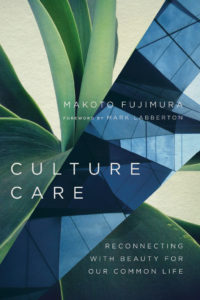 Culture Care: Reconnecting with Beauty for Our Common Life Makoto Fujimura (IVP) $17.00 We carried – and duly raved about – an early version of this that Mako had published himself through his International Arts Ministry. We were honored to carry that but were glad to hear a more mainstream publisher had picked it up and re-issued it in an expanded and very handsome trade paperback edition. This is quintessential Mako, arguably one of the best spokespersons for Christian perspectives in the art world today. This is a fabulous little book, well-written, stimulating, full of surprising lines and vivid stories.
Culture Care: Reconnecting with Beauty for Our Common Life Makoto Fujimura (IVP) $17.00 We carried – and duly raved about – an early version of this that Mako had published himself through his International Arts Ministry. We were honored to carry that but were glad to hear a more mainstream publisher had picked it up and re-issued it in an expanded and very handsome trade paperback edition. This is quintessential Mako, arguably one of the best spokespersons for Christian perspectives in the art world today. This is a fabulous little book, well-written, stimulating, full of surprising lines and vivid stories.
I like the observations about it offered by Cherie Harder, President of The Trinity Forum:
In his generous and inspiring work Culture Care, artist Mako Fujimura suggests that our common culture is not a territory to be captured, but a garden to be cultivated, needing the nourishment of creativity, community, connection, and the generation of beauty. It is a grace-filled call to beat swords into plowshares and take up the work of tilling our common garden.
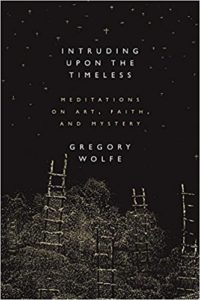 Intruding Upon the Timeless: Meditations on Art, Faith, and Mystery (revised, expanded) Gregory Wolfe (Square Halo Books) $22.99 Just a week or so ago I described this wonderful new expanded edition of an older favorite and said that “If I were to pick one book I was most thrilled to see this year in this whole arena of faith and the arts it is this wonderfully revised, second edition of Intruding Upon the Timeless: Meditations on Art, Faith, and Mystery by Image Journal editor Gregory Wolfe. I loved the first version and the second is, if one can imagine it, a great improvement.”
Intruding Upon the Timeless: Meditations on Art, Faith, and Mystery (revised, expanded) Gregory Wolfe (Square Halo Books) $22.99 Just a week or so ago I described this wonderful new expanded edition of an older favorite and said that “If I were to pick one book I was most thrilled to see this year in this whole arena of faith and the arts it is this wonderfully revised, second edition of Intruding Upon the Timeless: Meditations on Art, Faith, and Mystery by Image Journal editor Gregory Wolfe. I loved the first version and the second is, if one can imagine it, a great improvement.”
I invite you to browse back and read that full review, explaining as I did a bit about Wolfe’s great prose, his deep and wise insights about culture, his great knowledge about writers and artists. If you know Image you know what I’m talking about – he is highly regarded, with endorsing blurbs from the likes of Pulitzer Prize winner Annie Dillard.
I explained that this new edition has considerably more essays and each chapter has marvelous black and white woodcuts or art prints, now, making it a much more illustrated and artful volume. Some of the art from world-renowned printmaker Barry Moser that was in the first edition remain, but it is supplemented with more, including some by artists who did original work for this book.
Truly, the revised, expanded edition of Intruding Upon the Timeless: Meditations on Art, Faith, and Mystery deserves to be considered one of the very best books of 2017. Thanks to Mr. Wolfe, and to Square Halo Books for designing such a very handsome, aesthetically pleasing edition.
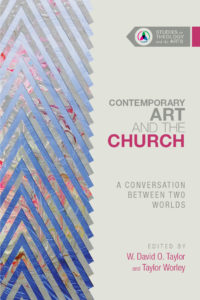 Contemporary Art and the Church: A Conversation Between Two Worlds edited by David W. Taylor (IVP Academic) $30.00 This is yet another volume in the exceptional “Studies in Theology and the Arts” series, and it is without doubt deserving of a Best Book award for 2017. (I have reviewed the others in this series as well, and they are all remarkable; start with Cam Anderson’s serious 2016 release The Faithful Artist: A Vision for Evangelicalism and the Arts if you want to work through one of them.) This 2017 one is particularly about very contemporary art (that is to say, mixed media, postmodern, installation and other deconstructing and transgressive stuff by the likes of Jeff Koons or Ai Weiwei, not the older “modern” art like Van Gogh or Picasso who worked in the 1800s and into the mid-1900s.)
Contemporary Art and the Church: A Conversation Between Two Worlds edited by David W. Taylor (IVP Academic) $30.00 This is yet another volume in the exceptional “Studies in Theology and the Arts” series, and it is without doubt deserving of a Best Book award for 2017. (I have reviewed the others in this series as well, and they are all remarkable; start with Cam Anderson’s serious 2016 release The Faithful Artist: A Vision for Evangelicalism and the Arts if you want to work through one of them.) This 2017 one is particularly about very contemporary art (that is to say, mixed media, postmodern, installation and other deconstructing and transgressive stuff by the likes of Jeff Koons or Ai Weiwei, not the older “modern” art like Van Gogh or Picasso who worked in the 1800s and into the mid-1900s.)
The essays collected here are thoughtful, rich, engaging, positive, and unlike any collection you have seen on any religious publisher. Contemporary Art and the Church is a rare, deep voice, but not utterly alone and it takes its place alongside a handful of other scholarly work works that seriously engage the ethos of the contemporary art seen out of a positive Christian vision. This is simply extraordinary. Read our BookNotes review of it from last June if you want, or just buy it now because, well, it’s one of the Best Books of 2017
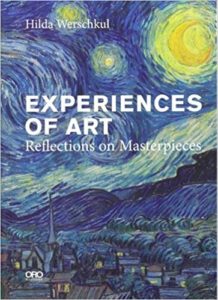 Experiences of Art Hilda Werschkul (ORO Editions) $29.95 I have to admit, per usual, that I am no scholar, and in this field, am nearly winging it. Yes, I’ve read Calvin Seerveld’s essays Art History Revisited and have struggled to understand Normative Aesthetics. But, in awarding this interesting book a 2017 honorable mention I want to be clear that I am not sure if she is right about any of her evaluations, interpretations, and art historical critique that she brings to her descriptions of great masterpieces of Western art history. I just know this is a rare book, fascinating, a volume that will reward readers with hours of learning, inspiration, perhaps even insight and joy.
Experiences of Art Hilda Werschkul (ORO Editions) $29.95 I have to admit, per usual, that I am no scholar, and in this field, am nearly winging it. Yes, I’ve read Calvin Seerveld’s essays Art History Revisited and have struggled to understand Normative Aesthetics. But, in awarding this interesting book a 2017 honorable mention I want to be clear that I am not sure if she is right about any of her evaluations, interpretations, and art historical critique that she brings to her descriptions of great masterpieces of Western art history. I just know this is a rare book, fascinating, a volume that will reward readers with hours of learning, inspiration, perhaps even insight and joy.
Werschkul has lots of credentials (including a doctorate in art history from Columbia University) but one of the most germane is that she has taught introductory art history courses for years. In this book she walks us through the “gallery” of many great paintings from any great eras and tells about them. Can’t afford to travel to a world-class museum and hire your own docent? This book will be a good alternative. And not only does she bring good insights and curious stuff about each work, she often draws on conversations with students that she has had over the years. That is, she knows what those of us not trained in art history may want to know, questions we may have, and even, sometimes, responses to debates that ensued with her students. This really does invite us to experience art, and to engage in experiences of art by taking in these multi-disciplinary conversations.
Here is how the publisher describes the uniqueness of this interesting book:
Experiences of Art: Reflections on Masterpieces is a critique of art history that takes historical inquiry beyond the level of recited facts to new insights drawn from a thematic approach to selected periods in the history of art.
Here is a bit of the way they describe a few of the later chapters:
The fourth chapter provides a thorough investigation of a paradoxical situation running throughout the “Age of Reason” of the 18th century, showing that beginning from the time of Louis XIV to the Romantic period, there were actually conflicting tendencies between rationalism and anti-rationalism. The chapter investigates art through the fabric of history, philosophy, and literature. The final chapter on modern art begins with van Gogh, the first artist who pursued art as a means of self-fulfillment and self-expression and thereafter unravels the history of modernism’s dialectic between artists’ creative selves and their relationship to the world around them. The chapter resumes the theme of the crisis of the Enlightenment from the previous chapter, leaving the reader with an impression of how a crisis of subjectivity has manifested itself in art since the beginnings of modernity to contemporary day times.
Funny, reading through some of this I ran over to our bookstore to pull off the shelf Nancy Pearcey’s Saving Leonardo which explores the shift in worldviews and values as shown in older art into modern pop culture. She is an astute cultural critic with a big picture view. That Hilda Werschkul’s Experiences of Art made me behold and ponder, helped me learn something, and brought me delight makes me think it’s worth an award.
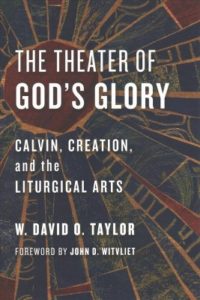 The Theater of God’s Glory: Calvin, Creation, and the Liturgical Arts W. David O. Taylor (Eerdmans) $30.00 I perhaps should have listed this in our last post when I was awarding the Best Books of Theology as this certainly is deserving in that world. But yet, this extraordinary book is multi-disciplinary and, like many of my favorite books, crosses boundaries and can serve well a diversity of interested readers. It is, as you can tell, a study of John Calvin, and for that alone, it is worth the price and deserving of accolades. That we can root our interests in the arts and cultural renewal in the goodness of creation – the theater of God as Calvin famously called it – is essential to ponder and Taylor takes this theme in rich and generative directions. He shows what Jeremy Begbie says in a vivid endorsement, “treasures easily overlooked.”
The Theater of God’s Glory: Calvin, Creation, and the Liturgical Arts W. David O. Taylor (Eerdmans) $30.00 I perhaps should have listed this in our last post when I was awarding the Best Books of Theology as this certainly is deserving in that world. But yet, this extraordinary book is multi-disciplinary and, like many of my favorite books, crosses boundaries and can serve well a diversity of interested readers. It is, as you can tell, a study of John Calvin, and for that alone, it is worth the price and deserving of accolades. That we can root our interests in the arts and cultural renewal in the goodness of creation – the theater of God as Calvin famously called it – is essential to ponder and Taylor takes this theme in rich and generative directions. He shows what Jeremy Begbie says in a vivid endorsement, “treasures easily overlooked.”
Further, Taylor moves from Calvin studies and a robust creational theology to how this might fund our work in the arts, particularly within the church. Taylor would certain say that the arts are for the whole culture and for art to be faithfully Christian it need not be worshipful to enhance our liturgies. But, heaven knows, we need more rich liturgical art, and this book shows how we can get beyond some of the unhelpful limitations Calvin offered and move forward in faithful, creative ways. Thank God for the Calvin Institute of Christian Worship who apparently helped fund this, and for this very exciting series of books on liturgical studies. It will us think about worship that is beautiful and joyful. Taylor is an artist, critic, professor and director of Brehm Texas, an initiative of Fuller Seminary integrating worship, theology and the arts.
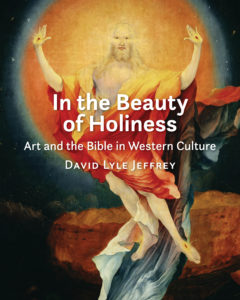 In the Beauty of Holiness: Art and the Bible in Western Culture David Lyle Jeffrey (Eerdmans) $49.00 This splendid, recent book is surely one of the most significant works published this year and even more certainly one of the most significant books on art, faith, and aesthetics in many a year. It nearly goes without saying that it deserves awards and we add our small voice here to the chorus of those who have honored it.
In the Beauty of Holiness: Art and the Bible in Western Culture David Lyle Jeffrey (Eerdmans) $49.00 This splendid, recent book is surely one of the most significant works published this year and even more certainly one of the most significant books on art, faith, and aesthetics in many a year. It nearly goes without saying that it deserves awards and we add our small voice here to the chorus of those who have honored it.
Here is what I wrote about it in a previous BookNotes not long ago: It is hefty, although not quite a coffee table book. There are gorgeously reproduced full color art pieces on glossy paper but there is very, very extensive text. David Lyle Jeffrey, you should know, is one of our most brilliant literary critics – he teaches at Baylor and has written for top-notch journals such as First Things, Books & Culture, and Image. This is not only a lavishly illustrated book on faith and art but it is a major work by a major scholar.
One of the unique features made by this learned study is that it isn’t just another study of faith and the arts (although if Jeffrey did a generic book like that it would be essential reading) but it makes a contribution about “the beauty of holiness.” In a sense this is not just a book about architecture and art and such but it is about the place of beauty in our desire for holiness. That is, it is about spiritual formation and it is about philosophy and theology. It is over 420 pages and is simply spectacular. Clearly one of the Best Books of 2017.
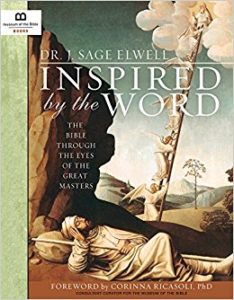 Inspired by the Word: The Bible Through the Eyes of the Great Masters Dr. J. Sage Elwell (Museum of the Bible Books/Worthy) $24.99 I want to honor this one, too, even if it isn’t as scholarly or lavish as the serious one celebrated above. It was produced by the new Museum of the Bible in Washington DC and it is very, very nice.
Inspired by the Word: The Bible Through the Eyes of the Great Masters Dr. J. Sage Elwell (Museum of the Bible Books/Worthy) $24.99 I want to honor this one, too, even if it isn’t as scholarly or lavish as the serious one celebrated above. It was produced by the new Museum of the Bible in Washington DC and it is very, very nice.
Read how I described it in that same BookNotes and see if you don’t think it deserve a very honorable mention.
If one doesn’t want a book quite as learned and quite as lavish as the expensive and glorious David Lyle Jeffrey one shown above, this is also a great choice – less costly, less academic, and a bit less weighty. The artwork here is not reproduced on heavy, glossy paper, but it is nonetheless a beauty to behold with lots and lots of color. It is only a slightly oversized hardback and makes a nice gift without being too intense or deep.
The great contribution of Inspired by the Word is that it truly does show how Biblical texts have influenced great painters and other artists and it shows paintings and art pieces that are directly influenced by Bible stories. This is not only fascinating and inspiring but it is useful for Sunday school educators and Bible teachers, too, if they need to supplement their classes with Biblical-inspired art.
Throughout history, the back cover reminds us:
…the great stories and heroes of the Bible have been depicted in art – drawn on walls, carved in stones, stitched into tapestries, or painted on canvases that decorated homes or churches. No other book has inspired and influenced such creativity and beauty.
This book shows a lot of artwork, from a beautifully carved forth century sarcophagus to a twentieth century painting by Salvador Dali. Great masters such as Rubens, Bernini, Botticelli, and Rembrandt are all here. This is a very nice volume at a very reasonable price making it a great value. Which, in my view, means it is well worth honoring, even celebrating. Kudos.
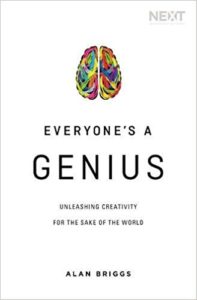 Everyone’s a Genius: Unleashing Creativity for the Sake of the World Alan Briggs (Nelson) $16.99 I truly want to shout about this book, honor it as one of the great books this year, but I’m not sure where to put it. I don’t know where to shelve it in the store, and not sure what clever award to bestow upon it. Frankly, it is not about the arts as such. And it isn’t about enhancing your creativity to become artistic, except in a general sense. Perhaps it is a book about leadership, or about congregational life. Briggs is a great missional thinker — I just adore his Staying Is The New Going and appreciated his wise book about missional church planting principles called Guardrails.) But this – wow – it is a bit about finding one’s sweet spot of calling and flow, it is about creating zones or spaces that can be incubators of creativity, it is about realizing that we are all great at something.
Everyone’s a Genius: Unleashing Creativity for the Sake of the World Alan Briggs (Nelson) $16.99 I truly want to shout about this book, honor it as one of the great books this year, but I’m not sure where to put it. I don’t know where to shelve it in the store, and not sure what clever award to bestow upon it. Frankly, it is not about the arts as such. And it isn’t about enhancing your creativity to become artistic, except in a general sense. Perhaps it is a book about leadership, or about congregational life. Briggs is a great missional thinker — I just adore his Staying Is The New Going and appreciated his wise book about missional church planting principles called Guardrails.) But this – wow – it is a bit about finding one’s sweet spot of calling and flow, it is about creating zones or spaces that can be incubators of creativity, it is about realizing that we are all great at something.
I’m not sure I agree with that, and I generally am not drawn to those books about discovering your inner artist and discerning your Big Deal. But I trust Alan – remember, he wrote the book about staying put in non-sensational small towns and told us it’s okay to be ordinary. So this study of how genius is developed, what it means that we can unlock our aesthetic genius and serve well in the culture. As one reviewer put it, Everyone’s a Genius will “coax the genius out of you.” If this helps us understand the creative process – perhaps like my friend Justin McRobert’s Title Pending: Things I Think about When I Make Stuff, then this surely deserves some acclaim. The footnotes themselves are worth the price of the book. He does good work. Three cheers for helping us cut loose.
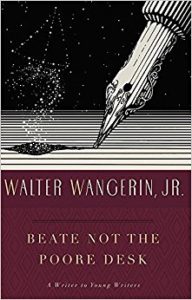 Beate Not the Poor Desk: A Writer to Young Writers Walter Wangerin, Jr. (Rabbit Room Press) $14.95 Leave it to the indie book shop and publishing house in Nashville with the intriguing Inkling-esque name to come up with a Walt Wangerin manuscript on writing. And leave it to Walter Wangerin to offer another fantastic memoir-istic, storytelling guide to life; in this case, the writing life. This is a quick and lovely read, full of advice and insight, including hard-won stuff from his own failures and mis-steps. As it says on the back,
Beate Not the Poor Desk: A Writer to Young Writers Walter Wangerin, Jr. (Rabbit Room Press) $14.95 Leave it to the indie book shop and publishing house in Nashville with the intriguing Inkling-esque name to come up with a Walt Wangerin manuscript on writing. And leave it to Walter Wangerin to offer another fantastic memoir-istic, storytelling guide to life; in this case, the writing life. This is a quick and lovely read, full of advice and insight, including hard-won stuff from his own failures and mis-steps. As it says on the back,
For the first time, National Book Award-winner Walter Wangerin, Jr., turns his keen eye upon the craft of writing. By adding a lifetime of experience to the wisdom and examples of other writers (Shakespeare, Goethe, Berry, Chaucer, and many more), he builds for us an intricate picture of the craft and its subtlties. But in revealing his personal missteps, his own processes, and his own story, Wangerin provides lampposts for young writers as they embark on the long road toward mastery. Through practical advice, ethical considerations, and a master’s definition of art itself, Wangerin draws us all closer to what it means to write–and to write well.
I loved this book, and if you are interested in the creative process or good writing or the stories from this respected author, you will agree that this deserves a great shout out here at the end of 2017. Raise a pint!
BEST BOOKS ABOUT CHURCH LIFE
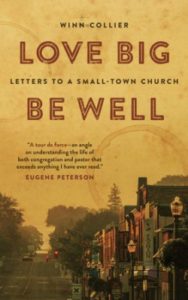 Love Big, Be Well: Letters to a Small-Town Church Winn Collier (Eerdmans) $16.99 Those who read BookNotes or attend events where Hearts & Minds has displayed books this fall will know that I adored this book, talked it up everywhere we went (even in some unlikely venues) and tried hard to tell people why it is one of my favorite books of the year. It is a novel, yes, and should properly be filed under fiction, but we also keep it under congregational life.
Love Big, Be Well: Letters to a Small-Town Church Winn Collier (Eerdmans) $16.99 Those who read BookNotes or attend events where Hearts & Minds has displayed books this fall will know that I adored this book, talked it up everywhere we went (even in some unlikely venues) and tried hard to tell people why it is one of my favorite books of the year. It is a novel, yes, and should properly be filed under fiction, but we also keep it under congregational life.
Collier, a pastor and writer I deeply respect, has given us here a novel that unfolds as a series of letters from a down-to-Earth pastor who writes about real life and gives glimpse of real hope to his small town, and sometimes a bit cranky congregation. You learn about some real folks, find some ways they come to love better and trust God more. The letters are beautiful, and the weave together to form a very compelling, if a bit quiet, story. That Jonas McAnn, the pastor in the novel, reads good books (including, let’s just say it, Wendell Berry), make him a guy you’ll want to meet.
As they say in the publisher promo info, “Readers will discover what it means for a pastor and a church to do the slow work of ministry in community–anchored by a common place and buoyed by a life of faith that is meaningful, rooted, and true.”
So, this is really, really good, fun and calming and beautiful and interesting. It’s surely one of my favorite books of the year, maybe one of my favorite books in many a year. I hope you consider it.
I’m not alone, either, in naming this as an award-winning, extraordinary book. Here’s the big quote that says it all, from none other than Pastor and serious literary lover, Eugene Peterson:
A tour de force – an angle on understanding the life of both congregation and pastor that exceeds anything I have ever read.
Hey, if I were doing (as I have some years) an award for “best blurb on a book cover” this would be blue ribbon for sure. Wow.
But try this, too, a lovely, honest endorsement by Deirda Riggs, herself a fine, fine writer:
Love Big, Be Well is a welcome mat, a handwritten invitation, a gigantic wrap-around porch, a warm night filled with fireflies. There may not be a surefire formula for living a wide-open, hope-filled life, but this collection of earnest words comes very close.
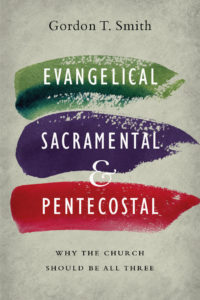 Evangelical, Sacramental & Pentecostal: Why the Church Should Be All Three Gordon T. Smith (IVP) $17.00 I respect this author immensely and hope you know his many books. They are well argued, lucid, deep without being arcane. He’s a good writer, a good teacher, and a deeply thoughtful spiritual man. Now working in higher education as president of Ambrose University in Calgary, Alberta, he continues to reflect on how our best, deepest faith traditions can nourish our lives today. His work is always helping us live well in the modern world, drinking from the deepest wells. In this regard he is a bit like Dallas Willard, perhaps like their mutual friend Richard Foster. I promise you he is not weird or sloppy or grandstanding. This is mature, solid stuff; I swear I wouldn’t honor it by including it on our Best Books of Year list if it wasn’t.
Evangelical, Sacramental & Pentecostal: Why the Church Should Be All Three Gordon T. Smith (IVP) $17.00 I respect this author immensely and hope you know his many books. They are well argued, lucid, deep without being arcane. He’s a good writer, a good teacher, and a deeply thoughtful spiritual man. Now working in higher education as president of Ambrose University in Calgary, Alberta, he continues to reflect on how our best, deepest faith traditions can nourish our lives today. His work is always helping us live well in the modern world, drinking from the deepest wells. In this regard he is a bit like Dallas Willard, perhaps like their mutual friend Richard Foster. I promise you he is not weird or sloppy or grandstanding. This is mature, solid stuff; I swear I wouldn’t honor it by including it on our Best Books of Year list if it wasn’t.
I don’t have to explain much about this book as the title says it all. I would like to think that evangelicals, liturgically oriented folks with a sacramental worldview and those involved in charismatic renewal would all find this book both enjoyable and a bit challenging. Most of us aren’t equally enamored with Word, liturgy and Spirit, so some chapters will warm your heart and others will blow your mind. If you aren’t strongly walking in any these traditions, consider it that much more important and maybe that much more challenging. But, I am sure, you will be not only challenged and stretched, you will be enthralled and blessed. Evangelical, Sacramental & Pentecostal is a great book making a vital case for a wholistic sort of mature faith that breaks boundaries. “Balanced” sounds rather moderate and boring, but in Smith’s good hands, it is a Godsend. I am sure this is one of the best books of the year, and maybe one that can help us in ways few other books can. Highly recommend.
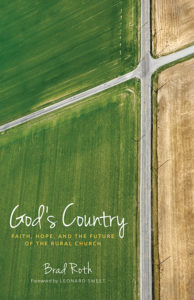 God’s Country: Faith, Hope and the Future of the Rural Church Brad Roth (Herald Press) $16.99 At a small church conference we attend each year called Wee Kirk I introduced this book and exclaimed that I’ve waited our whole career for it. In our 35 years of bookselling we’ve wanted a really, really good book on rural life, and this is it. It is readable (although it is a tad academic) and very thoughtful. Roth’s sophisticated analysis is based on up-to-date research and data (and he insists that rural life is on the upswing, with folks moving to the country in notable patterns, and with a new generation of young adults taklng up the farming life.) I love his sense of place, his theology of geography, his understanding of the unique challenges and strengths of rural life, and how he sees this as an opportunity for good missional thinking. Len Sweet wrote a feisty forward and the whole package is just fantastic. We are very, very glad to announce this as one of the Best Books of the Year. Yeah!
God’s Country: Faith, Hope and the Future of the Rural Church Brad Roth (Herald Press) $16.99 At a small church conference we attend each year called Wee Kirk I introduced this book and exclaimed that I’ve waited our whole career for it. In our 35 years of bookselling we’ve wanted a really, really good book on rural life, and this is it. It is readable (although it is a tad academic) and very thoughtful. Roth’s sophisticated analysis is based on up-to-date research and data (and he insists that rural life is on the upswing, with folks moving to the country in notable patterns, and with a new generation of young adults taklng up the farming life.) I love his sense of place, his theology of geography, his understanding of the unique challenges and strengths of rural life, and how he sees this as an opportunity for good missional thinking. Len Sweet wrote a feisty forward and the whole package is just fantastic. We are very, very glad to announce this as one of the Best Books of the Year. Yeah!
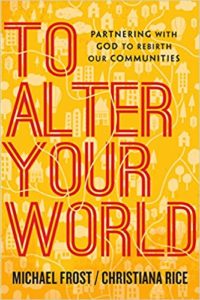 To Alter Your World: Partnering with God to Rebirth our Communities Michael Frost & Christiana Rice (IVP) $17.00 IVP released this in cooperation with the Forge American movement and is in their important, very useful, Praxis Line. That is, this is missional, activisitic, energetic, but attempting to be practical for living out faith commitments in the real world. Michael Frost and Christiana Rice are expert at casting vision, holding up new metaphors, and doing serious social analysis to help us think about what cultural and social transformation might really look like. Their awareness about what it takes to exegete one’s neighborhood and be serious agents of God’s renewal of all things is remarkable. You should listen to them.
To Alter Your World: Partnering with God to Rebirth our Communities Michael Frost & Christiana Rice (IVP) $17.00 IVP released this in cooperation with the Forge American movement and is in their important, very useful, Praxis Line. That is, this is missional, activisitic, energetic, but attempting to be practical for living out faith commitments in the real world. Michael Frost and Christiana Rice are expert at casting vision, holding up new metaphors, and doing serious social analysis to help us think about what cultural and social transformation might really look like. Their awareness about what it takes to exegete one’s neighborhood and be serious agents of God’s renewal of all things is remarkable. You should listen to them.
I particularly applaud – as I said in a previous BookNotes review – the way To Alter Your World offers and plays with the theme of midwifery. Birthing a new world. Bringing to term the stuff God is wanting to see “born in us today” as the old carol puts it. I found this not only imaginative and inspiring, but actually quite wise and provocative. I’ve used that language myself a bit, and these authors fleshed it out beautifully. Michael Frost has said that Christiana Rice gets all the credit for that. Indeed, the mother’s touch is here, and it is poignant and powerful, brave and creative.
Can we imagine our congregations and fellowships and faith communities as midwives to the new world God is birthing among us? Read this book and you will be ready. Don’t wait. This is the most potent/pregnant “missional” book I’ve read in years and one I will celebrate whenever we can. Thanks to Michael and especially Christiana for adding this breath-taking volume to the missional literature.
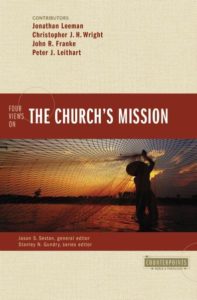 Four Views On The Church’s Mission edited by Jason Sexton (Zondervan) $16.99 I just love these point-counterpoint books and this one is as good as it gets. As I’ve described in a longer BookNotes review, this offers four different perspectives on the mission of the church, and after each main chapter, the other three bring their rebuttal and response. By hearing these voices side by side, you can determine what you think is most faithful and helpful (or not) in each of these classic perspectives.
Four Views On The Church’s Mission edited by Jason Sexton (Zondervan) $16.99 I just love these point-counterpoint books and this one is as good as it gets. As I’ve described in a longer BookNotes review, this offers four different perspectives on the mission of the church, and after each main chapter, the other three bring their rebuttal and response. By hearing these voices side by side, you can determine what you think is most faithful and helpful (or not) in each of these classic perspectives.
There are four main views; sorry if they seem a bit obscure. The book unfolds them well, and the debate is upbeat and helpful.
- Soteriological Mission by Jonathan Leeman
- Participatory Mission by Christopher Wright
- Contextual Mission by John Franke
- Ecumenical Political Mission by Peter Leithart
If this conversation weren’t so important maybe I wouldn’t feel compelled to celebrate this work – there are lots of good books that generate good theological discussion. But this, this is urgent stuff. Well done. I’m naming it side by side with the one below.
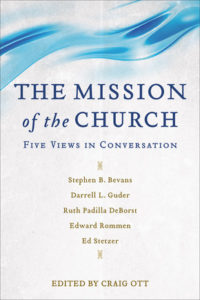 The Mission of the Church: Five Views in Conversation edited by Craig Ott (Baker Academic) $22.99 Okay, this is almost like the above one, but with five views, and five different sorts of views. Let’s call it a tie, since both are marvelous tools, helpful and necessary. I am very impressed with this one, and find that the voices representing a range of Christian traditions engage in a very enlightening conversation — an award winning one, I’d say.
The Mission of the Church: Five Views in Conversation edited by Craig Ott (Baker Academic) $22.99 Okay, this is almost like the above one, but with five views, and five different sorts of views. Let’s call it a tie, since both are marvelous tools, helpful and necessary. I am very impressed with this one, and find that the voices representing a range of Christian traditions engage in a very enlightening conversation — an award winning one, I’d say.
The Mission of the Church: Five Views is arranged just a bit differently than the one above; it offers five views, without rebuttal, and then in the second half each of the view authors give all of their responses to the others in one substantial critique.
I appreciate how they situate themselves and the traditions/strategies they represent. Here’s what they call them, and who wrote each one:
- A Prophetic Dialogue Approach, Stephen B. Bevans
A Multicultural and Translational Approach, Darrell L. Guder
An Integral Transformation Approach, Ruth Padilla DeBorst
A Sacramental Vision Approach, Edward Rommen
An Evangelical Kingdom Community Approach, Ed Stetzer
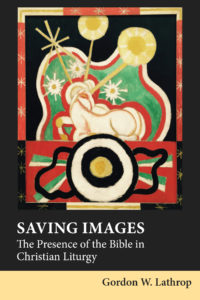 Saving Images: The Presence of the Bible in Christian Liturgy Gordon W. Lathrop (Fortress Press) $34.99 We stock a lot of what we might want to call liturgical theology books, not to mention resources for worship planning, books of lectionary-based prayers, collects and such. I wanted to honor at least one stand out book in this field and it seemed to me that Lathrop is nearly a rock star in this arena. It may be funny to think of him as such, but this author is respected and widely appreciated. He is an ELCA Lutheran who ha taught at Wartburg Seminary, the Lutheran Seminary in Philadelphia, the Virginia Theological Seminary, and at Yale Divinity School.
Saving Images: The Presence of the Bible in Christian Liturgy Gordon W. Lathrop (Fortress Press) $34.99 We stock a lot of what we might want to call liturgical theology books, not to mention resources for worship planning, books of lectionary-based prayers, collects and such. I wanted to honor at least one stand out book in this field and it seemed to me that Lathrop is nearly a rock star in this arena. It may be funny to think of him as such, but this author is respected and widely appreciated. He is an ELCA Lutheran who ha taught at Wartburg Seminary, the Lutheran Seminary in Philadelphia, the Virginia Theological Seminary, and at Yale Divinity School.
This book, as I suggested in our earlier BookNotes review, is a life-long passion of Lathrop’s and he is deep and scholarly in his explorations. How is the Bible to be read? What is the role of the Bible in our faith and in our worship? And how might a liturgical use of the Bible differ from our personal devotions or adult ed forums and Sunday school classes? There are no easy answers, but Lothrop is convinced that we underestimate the abiding power of the Word. This book shows how and why we should maximize the presence of the Scriptures in our worship.
Interestingly, many may think they use the Bible a lot in their worship, but he pushes back at that a bit, wondering if the cadence, language, and text of the canon really does form us in worship. This is an amazingly stimulating book. There are raves from heavy theologians like Robin Jensen of Notre Dame and Bible scholars like Walter Brueggemann (who calls it as “wise and remarkable book from which I have learned a great deal.”) This is scholarship that matters, and we are happy to honor it on our “Best of” list this year.
BEST BOOKS OF CULTURAL CRITICISM
Okay, we are in that time of the program when we realize we’re running out of time and there are a lot of awards to give out. I think the Director tells those setting up the awards to keep it quick and they start playing music even over Tom Hanks when he thanks his mama.
So, here we go. I could go on and on about these books, particularly, as they mean a lot to me. You’ll have to trust me on this. These are stellar.
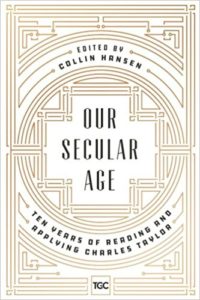 Our Secular Age: Ten Years of Reading and Applying Charles Taylor edited by Collin Hansen (The Gospel Coalition) $16.99 I suppose you’ve heard of the nearly impenetrable Catholic philosopher, Charles Taylor and his fat Harvard University Press book A Secular Age. (We have Taylor’s new one, by the way, on linguistics.) Taylor’s heavy insights about our “God haunted” ethos, not quite secular in the way most think, was translated well for many of us in James K.A. Smith’s very important (and helpful) How (Not) To Be Secular: Reading Charles Taylor that came out from Eerdmans in 2014.
Our Secular Age: Ten Years of Reading and Applying Charles Taylor edited by Collin Hansen (The Gospel Coalition) $16.99 I suppose you’ve heard of the nearly impenetrable Catholic philosopher, Charles Taylor and his fat Harvard University Press book A Secular Age. (We have Taylor’s new one, by the way, on linguistics.) Taylor’s heavy insights about our “God haunted” ethos, not quite secular in the way most think, was translated well for many of us in James K.A. Smith’s very important (and helpful) How (Not) To Be Secular: Reading Charles Taylor that came out from Eerdmans in 2014.
Well, this new anthology oddly doesn’t have Jamie Smith included, nor Tim Keller, who cites Taylor often, but it nonetheless is a collection of some of the best evangelical engagement with Taylor any of us have ever seen. How did faith go, they ask on the back cover, “from assumed to assaulted?” Nothing is easy about faith in this era, so this good gathering of writers, thinkers, and pastors weigh in on what is going on in these secularized days, and how Taylor might help.
Join Carol Trueman, Michael Horton, Jen Pollock Michel, Brett McCracken, Bruce Ashford, Greg Forster, Alan Noble, Mike Cosper, and others in this award winning collection of cultural studies. Alan Jacobs –whose book How To Think we mentioned in the last award’s list –says it is “a landmark book.”
I like Kevin Vanhoozer’s endorsement:
The essays in this helpful volume do more than borrow from Taylor: they engage, question, develop, and occasionally criticize his influential account of our complex cultural moment in which we all are trying to live, move, and have our being as disciples of Jesus Christ. Reading and applying the insights of those who have read and applied Taylor is a salutary exercise in understanding oneself and others in an age that is not only secular, but fragile, frustrated, and confused.
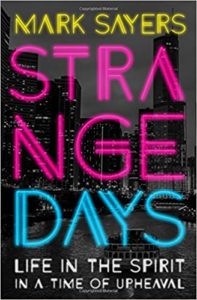 Strange Days: Life in the Spirit in a Time of Upheaval Mark Sayers (Moody Press) $13.99 I read anything by Mark Sayers, a sassy Aussie who has his finger on the pulse of US culture, and, now, the global scene as well. He is upbeat and clever, and his discernment about idols and ideologies, about habits of heart and the signs of life in pop culture are all truly remarkable.
Strange Days: Life in the Spirit in a Time of Upheaval Mark Sayers (Moody Press) $13.99 I read anything by Mark Sayers, a sassy Aussie who has his finger on the pulse of US culture, and, now, the global scene as well. He is upbeat and clever, and his discernment about idols and ideologies, about habits of heart and the signs of life in pop culture are all truly remarkable.
I should say more about this (and I have, in a previous shout out at BookNotes) but now I want to honorable mention this as a great, great book, helpfully offering a way to navigate these strange days of fear, terrorism, globalization, culture wars, harsh politics and more. It can be overwhelming. Are you are frightened or confused about the state of the wider world, the rapid change, the digital stuff? This easy-to-read book is one that I’m sure will help you.
“Does the world make you dizzy?” he colorfully asks? Do you get that these are strange days? Don’t miss this, it’s a great little book by an author you should know.
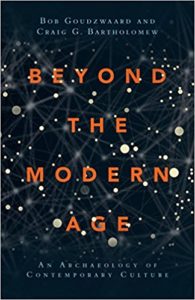 Beyond the Modern Age: An Archaeology of Contemporary Culture Bob Goudzwaard & Craig G. Bartholomew (IVP Academic) $30.00 This is one of the most stunning, informed, educational, sweeping, and prophetically wise books I’ve read in quite a while and these is no doubt I want to award it one of the very Best Books of 2017 awards. It is unlike most books I’ve read this year as it is so broad and big in it’s ambitious vision and yet so conscientious and finally, practical about hearing how ordinary people respond to this stuff. Goudzwaard, as you may know, is a hero of mine, a former Member of Parliament in Holland (in the Christian Democratic party that stands in the line of Abraham Kuyper’s AR Party) and he is a world-class economist.
Beyond the Modern Age: An Archaeology of Contemporary Culture Bob Goudzwaard & Craig G. Bartholomew (IVP Academic) $30.00 This is one of the most stunning, informed, educational, sweeping, and prophetically wise books I’ve read in quite a while and these is no doubt I want to award it one of the very Best Books of 2017 awards. It is unlike most books I’ve read this year as it is so broad and big in it’s ambitious vision and yet so conscientious and finally, practical about hearing how ordinary people respond to this stuff. Goudzwaard, as you may know, is a hero of mine, a former Member of Parliament in Holland (in the Christian Democratic party that stands in the line of Abraham Kuyper’s AR Party) and he is a world-class economist.
I wrote at very great length about this complex book (see here) and would simply refer you to that to see why I am so convinced this is a book worthy of your attention and worthy of a Hearts & Minds award.
I agree with scholar and professor Michael Goheen who says that:
Goudzwaard and Bartholomew are two of the very best at interpreting Western culture. They dig deep to the religious foundations of our culture, which is so important for the church’s mission today. This is a very important book!
And listen to David Dockery who insists:
Beyond the Modern Age is essential reading for all seeking to navigate their way through the complex cultural and worldview issues associated with the modernization of our world.
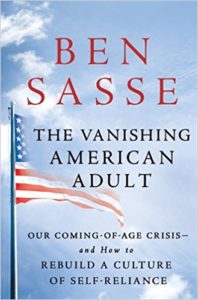 The Vanishing American Adult: Our Coming of Age Crisis and How to Rebuild a Culture of Self Reliance Ben Sasse (St, Martin’s Press) $27.99 What a lot of buzz this book got when it released this summer, and what a lot of good conversation we had talking about it. I am not sure I like all of it, and I certainly protest some of the voting pattern of this otherwise sensible and seemingly virtuous Senator. But, like it or not, this is a heckuva book, feisty, fearless, candid. It’s a book we need to pay attention to.
The Vanishing American Adult: Our Coming of Age Crisis and How to Rebuild a Culture of Self Reliance Ben Sasse (St, Martin’s Press) $27.99 What a lot of buzz this book got when it released this summer, and what a lot of good conversation we had talking about it. I am not sure I like all of it, and I certainly protest some of the voting pattern of this otherwise sensible and seemingly virtuous Senator. But, like it or not, this is a heckuva book, feisty, fearless, candid. It’s a book we need to pay attention to.
His thesis is fairly simple: today’s young adults are not growing up and taking their place in the world and it is somewhat because of how we have coddled them. I am very aware that this is a vast, and perhaps even hurtful, generalization, and there are exceptions. (Some young adults do not take their place in the world for reasons other than a silly lack of self-reliance, learned easily because they never had summer jobs.) Still, there is, I think, much truth to Sasse’s evaluation and his stories are striking.
One of his answers, by the way – and you can see why this should make us glad – is that young adults should be encouraged to read, to buy good books, to start a personal library. We have to learn to learn, to become more serious about our lives, and resist the tendency to shallowness. We are stuck in a digital culture that erodes much meaning. We are facing crumbling institutions that once formed strong communities. Who wouldn’t agree?
I like that one the back of this book there are all sorts of interesting blurbs offering vibrant endorsements. Mike Rowe, creator of the “Dirty Jobs” TV show says some chapters should be “required reading for every parent, every child, and every elected official.”
Larry the Cable Guy weighs in jokingly saying “as an adolescent myself, this book sheds some light on my situation.”
Listen to US Senator Cory Booker;
I know Ben Sasse as one of the most important emerging voices in our national dialogue ― plain-spoken, brilliant, and unafraid to speak his mind. Whether we agree or disagree, when he speaks ― I’m listening. And when he writes, I’m definitely reading.
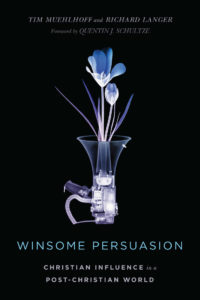 Winsome Persuasion: Christian Influence in a Post-Christian World Tim Muehlhoff and Richard Langer (IVP Academic) $22.00
Winsome Persuasion: Christian Influence in a Post-Christian World Tim Muehlhoff and Richard Langer (IVP Academic) $22.00
This book is very good and time doesn’t allow me to explain it all here. First, know this – the authors are advocates for civility and persuasion (think of Richard Mouw’s lovely Uncommon Decency and Os Guinness’s brilliant book Fools Talk.) This call for engaging the broader culture with a civil posture that shows love and respect is itself worthy of any number of awards this hard year. So we celebrate an evangelical book that invites us to be both persuasive and civil, shrewd and gracious, to make out points but to listen well. It is, as Jonathan Merritt says, “a book whose time has come.”
But this is more than a much-needed reminder to be gracious. It is even more than a call to persuade, to know how to convince others of our views (rather than just proclaiming or insisting or fighting or taking over.) It is, in fact, a deep study of communication theory, or rhetoric, of conflict and of what it means to be, as they put it, a “counterpublic.”
Even if you don’t agree with all their positions which they use as case studies on how to be compelling and persuasive and kindly as we make a case, the points will be clear and helpful.
My goodness, we need this. We honor its intention and offer thanksgiving for publishers like IVP who are themselves winsome and persuasive. This is a good book and we are happy to mention it here.
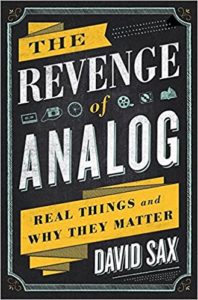 (Public Affairs) $25.99 What a very well written, lovely, interesting, and inspiring book this is. You may recall my previous description of it in an earlier BookNotes, but it is, essentially, a creative non-fiction study of this author’s journey to things that matter, real things. That is, he explores the rise of record stores. He visits coffee houses that specialize in offering board games. He tells about the return of stationary stores. Of course, he is all about the local bookstore. The chapter about real film is amazing.
(Public Affairs) $25.99 What a very well written, lovely, interesting, and inspiring book this is. You may recall my previous description of it in an earlier BookNotes, but it is, essentially, a creative non-fiction study of this author’s journey to things that matter, real things. That is, he explores the rise of record stores. He visits coffee houses that specialize in offering board games. He tells about the return of stationary stores. Of course, he is all about the local bookstore. The chapter about real film is amazing.
Who knew that all these “analog” things are coming back with a vengeance?
And who knew the cultural significance of these trends?
I love this kind of a book, reportage, memoir, storytelling, and social analysis. Sax is a really good writer, and a fine analysis. His celebration of physical stuff is stunningly good and his insights resonate with this claim by Kevin Kelly (founder of Wired and author of The Inevitable) who says, “The better digital gets the more important analog becomes.” A bit surprisingly, he says, “Sax’s reporting is eye-opening and mind-changing.”
And that deserves an award. It’s easy to convince old school guys like me. To change the brilliant mind of a Kevin Kelly, well, that’s the mark of a very good book. Three big real life cheers!
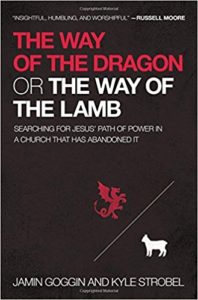 The Way of the Dragon or the Way of the Lamb: Searching for Jesus’s Path of Power in a Church That has Abandoned It Jamin Goggin & Kyle Strobel (Nelson Books) $16.99 I described this at BookNotes when it came out early in 2017 and I’ve been waiting almost a year to say it – this is one of the great books I’ve read this year. I highly recommend it as it is both vibrant and faith building, Biblical and theologically solid, but also provocative and stretching as it explores how we can follow Jesus well, embracing even his upside-down view of power. What is the role of weakness in Christ and in our own faith journey? What does it mean to let go of ambition and power? What, really, does it look like to follow Jesus?
The Way of the Dragon or the Way of the Lamb: Searching for Jesus’s Path of Power in a Church That has Abandoned It Jamin Goggin & Kyle Strobel (Nelson Books) $16.99 I described this at BookNotes when it came out early in 2017 and I’ve been waiting almost a year to say it – this is one of the great books I’ve read this year. I highly recommend it as it is both vibrant and faith building, Biblical and theologically solid, but also provocative and stretching as it explores how we can follow Jesus well, embracing even his upside-down view of power. What is the role of weakness in Christ and in our own faith journey? What does it mean to let go of ambition and power? What, really, does it look like to follow Jesus?
You may know that I think Andy Crouch’s important book Playing God: Redeeming the Gift of Power is the benchmark for any book on this topic. His follow up, Strong and Weak about love and risk is a must-read follow up. Those are among the best books of the decade, exactly on this topic! But right after those two, take up The Way of the Dragon or the Way of the Lamb.
I was delighted by how Goggin and Stobel engaged so many thoughtful cultural critics and faith leaders, from Marva Dawn to Dallas Willard, from John Perkins to Jean Vanier to Dietrich Bonhoeffer. And yes, they refer to Andy Crouch’s work a bit. That is, they’ve done their homework and they’ve engaged this stuff thoughtfully and faithfully and very well. I was exceptionally impressed and I hope you will be to. It’s a great book.
Thanks to Goggin and Strobel for pushing us towards the way of the Lamb. My hats off to them for that, and this book surely gets on our big list of the Best Books of the Year.
BEST BOOK COMMEMORATING THE 500th ANNIVERSARY OF THE PROTESTANT REFORMATION
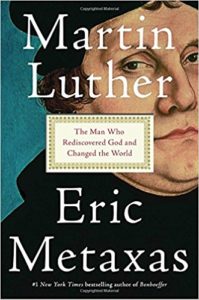 Martin Luther: The Man Who Rediscovered God and Changed the World Eric Metaxas (Viking) $30.00 I have perused dozens of books on this topic this season, taught a short class at my own church, and created two pretty hefty bibliographies of just some of the many books we stock on this topic. (See that pair of annotated lists, here:
Martin Luther: The Man Who Rediscovered God and Changed the World Eric Metaxas (Viking) $30.00 I have perused dozens of books on this topic this season, taught a short class at my own church, and created two pretty hefty bibliographies of just some of the many books we stock on this topic. (See that pair of annotated lists, here:
Still, if I had to hone it down to just one (and the only reason I have to is because I’m running out of time and stamina) I have to say that this riveting, easy-to-read but well researched biography is my favorite book on Luther published this year. Sure there are older classics, and we are fond of all sorts of recent stuff, from Brand Luther: How an Unheralded Monk Turned His Small Town Into a Center of Publishing, Made Himself the Most Famous Man in Europe to an amazingly dark graphic novel expertly done by Plough Publishing called Renegade. I loved Steven Nichols small The Reformation: How a Monk and a Mallet Changed the World and we’ve been featuring his Reformation ABCs children’s book (with fantastic, colorful illustrations by Ned Bustard.) And the subtitle of this is kinda odd. Luther “rediscovered God”?
But, again, ladies and gentleman, all things considered, in a field packed with excellent work and lots of great books, Mr. Metaxas, as was seen in his great books on Bonhoeffer and Wilberforce, has a notable gift of telling a great story, bringing in lots of history and amazing detail and mostly solid information, with writerly force and grand verve. I think this is the best book on Luther I’ve ever read and we happily put it on the list of Best Books of 2017.
TWO GREAT, NEW BOOKS ABOUT CHRISTIAN HIGHER EDUCATION
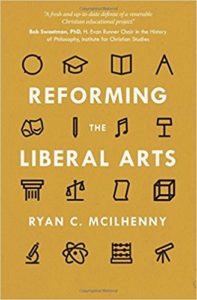 Reforming the Liberal Arts Ryan C. Mcilhenny (Falls City Press) $14.95 You may know not this but there is quite a cottage industry of books about college and university life – some that end up as best-sellers and culturally significant, actually. Christians have written wisely into that world, and this brand new little book is a perfect example of how people of faith can offer a unique perspective on the meaning of learning and the significance of a liberal arts education.
Reforming the Liberal Arts Ryan C. Mcilhenny (Falls City Press) $14.95 You may know not this but there is quite a cottage industry of books about college and university life – some that end up as best-sellers and culturally significant, actually. Christians have written wisely into that world, and this brand new little book is a perfect example of how people of faith can offer a unique perspective on the meaning of learning and the significance of a liberal arts education.
For some reason, we stock a number of books like this, even though I suppose not many college professors shop here. Maybe it is quixotic, but I love these books and would like to think celebrating the very best might encourage someone.
This is a nearly brand new book so it just gets in to the Best Books of 2017 list.
Here is what I wrote about it a few weeks ago. I hope this shows why we honor it.
Not only is this a good book for any teacher, dean, administrator, or resident hall director, I think any church near a college and certainly anyone working in campus ministry needs to be able to be familiar with this wise and compelling argument for what Bob Sweetman (of the Institute for Christian Studies) says on his front-cover blurb is “a venerable Christian educational project.”
Our friend the philosophy Esther Lightcap Meek says Reforming the Liberal Arts sounds all the major tones a book like this should but also:
…augments it with zesty new notes: current research in brain studies, in the impact of technology, and in best educational practices. It is a chord anchored at the base in years of seasoned practice teaching and inspiring students.
McIllhenny has a PhD from the University of California, Irvine and now teaches at an overseas campus project of Geneva College in Shanghai, China. What a great author and what a great little book. We think it deserves a special place on this list.
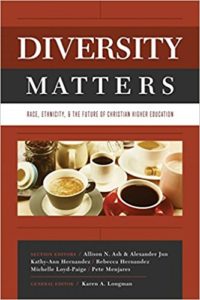 Diversity Matters: Race, Ethnicity & The Future of Christian Higher Education edited by Karen Longman (Abilene Christian University Press) $29.99 The minute I heard about this big volume from the CCCU (the Council for Christian College and Universities, I was overjoyed as it is so very urgently needed. And in the moments I first saw it I knew I’d want to award it one of our Best Books awards. I can assure you there is nothing in print like it; nothing even close. It is excellent.
Diversity Matters: Race, Ethnicity & The Future of Christian Higher Education edited by Karen Longman (Abilene Christian University Press) $29.99 The minute I heard about this big volume from the CCCU (the Council for Christian College and Universities, I was overjoyed as it is so very urgently needed. And in the moments I first saw it I knew I’d want to award it one of our Best Books awards. I can assure you there is nothing in print like it; nothing even close. It is excellent.
I know several people who work hard in the context of uniquely Christian colleges and university at making their campuses safe and welcoming for all sorts of folks. Most have African American, Latino/Latina, Asian-American, and Native American students and — for reasons that might be obvious when we think of the vastness of the global church – they also have students from all over the world. Cultural, ethnic, and racial inclusion at Christ-honoring colleges is a big deal, complex, and leaders of these schools know it. Most want to be Christ-like and gracious and the best are working to do what they think they should to advance the cause of diversity and inclusion.
This amazing book offers five key sections. There are campus case studies showing how institutions can be transformed with a commitment to diversity; another section offers lessons of resiliency and leadership from long-term CCCU diversity professionals, and a section called “voices from our friends” is where minority students and staff speak for themselves. There is a section that offers curricular and co-curricular initiatives that might enhance diversity awareness and action within Christian higher education and a section on autoethnographies where emerging leaders and others are invited to tell about career stages. There are discussion questions at the end of each section, mostly, it seems, for faculty, administrators, and staff.
There is much more that should be said about this thick book about the diversity initiative within the CCCU. We are honored to stock it, eager to promote it, and are utterly sincere in offering it a place on our list of the Best Books of 2017. Hats off to Longman and her team, Allison N. Ashe & Alexander Jun, Kathy-Ann Hernandez, Rebecca Hernandez, Michelle Loyd-Paige and Pete Menjares. You’re the best!
BEST BOOK ABOUT GLOBAL JUSTICE
We have a huge section of books on global concern, peacemaking, immigration, global climate change and more. I could list many that are excellent, many more that just look really, really good. For our big Best of 2017 I want to just list one.
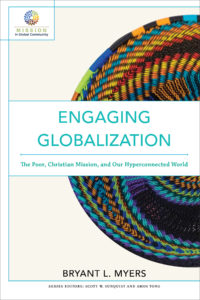 Engaging Globalization: The Poor, Christian Mission, and Our Hyperconnected World Bryant L. Myers (Baker Academic) $26.99 Byers is a professor of transformational development in the School of Intercultural Studies at Fuller Theological Seminary, one of the most cutting edge research centers on these things on the planet. We stock many of the books that come out of their school. We are especially fond of the series (again, from Fuller) of which this book is a part, called “Mission in Global Community” which is edited by Scott Sunquist and Amos Young. Bryant Myers has gotten many awards for his important mission writings over the years and it is humbling for us to try to honor him here, for this. Engaging Globalization is a remarkable, important, and stimulating work, and it deserves any accolades it receives.
Engaging Globalization: The Poor, Christian Mission, and Our Hyperconnected World Bryant L. Myers (Baker Academic) $26.99 Byers is a professor of transformational development in the School of Intercultural Studies at Fuller Theological Seminary, one of the most cutting edge research centers on these things on the planet. We stock many of the books that come out of their school. We are especially fond of the series (again, from Fuller) of which this book is a part, called “Mission in Global Community” which is edited by Scott Sunquist and Amos Young. Bryant Myers has gotten many awards for his important mission writings over the years and it is humbling for us to try to honor him here, for this. Engaging Globalization is a remarkable, important, and stimulating work, and it deserves any accolades it receives.
Greg Okesson of the E. Stanley Jones School of World Missions at Asbury says the book is “as astute as it is compelling.” Soong-Chan Rah of North Park calls it “an essential text.” Jehu Hanciles of Candler says it is “engaging… both timely and instructive.”
Krisanne Vaillancourt Murphy (who co-wrote the excellent Advocating for Justice) says:
Myers shares a compelling vision for how ordinary laity, church leaders, and people of goodwill are called to partake in God’s work of restoration and redemption. A must read for anyone who desires to be transformed and to change the world.
We award it because it brings together so much, so thoughtfully, and because it is so very important. His passion for the poor is legendary, his insights abut what really transforms cultures and economic systems for greater justice is astute. Maybe this quote from Roland Hoksbergen at Calvin College says it best:
Engaging Globalization calls Christians everywhere to the redemptive task of appreciating the good of secular theories and practices of globalization, while at the same time revising and reforming these theories and practices with our deep awareness of God, our image-bearing humanity, and the purpose God has given us. For a world that is both in thrall to and threatened by the secularizing forces of globalization, this is a message we desperately need.
Indeed. Kudos one and all. We humbly offer this big book about the wide world a place on the Best of 2017 list from our small town Hearts & Minds.
FOUR BOOKS AWARDED FOR TELLING THEIR STORY ABOUT A SPECIFIC FIELD – MEMOIR MEETS A MOVEMENT
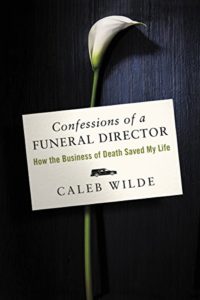 Confessions of a Funeral Director: How the Business of Death Saved My Life Caleb Wilde (HarperOne) $25.99 I did not know when I started this that Caleb Wilde was an internet rock star in the movement for “death positive” messages and reform of the funeral industry. (I also didn’t know that one of my very best friends knows him, and that Caleb’s mom helped lead my friend to Christ, in the early 1970s when they dated in high-school – that’s worth an award right there!)
Confessions of a Funeral Director: How the Business of Death Saved My Life Caleb Wilde (HarperOne) $25.99 I did not know when I started this that Caleb Wilde was an internet rock star in the movement for “death positive” messages and reform of the funeral industry. (I also didn’t know that one of my very best friends knows him, and that Caleb’s mom helped lead my friend to Christ, in the early 1970s when they dated in high-school – that’s worth an award right there!)
But I did know that one of my all time favorite writers, Thomas Lynch, who wrote some of my all time favorite books such as The Undertaking, had a nice endorsement on the back. Earlier this year I finally read the amazing, edgy book about reforming the cremation industry (called, yep, Smoke Gets In Your Eyes) so I was eager to read more about the deeper meaning of this moving trade and apparently important voice within that industry. Wilde is a fourth generation funeral parlor guy –before 1954 his grandparents drained the blood from the bodies they embalmed in their kitchen sink! And he lives not that far from us in South Central Pennsylvania, a bit East of Philadelphia.
Confessions of a Funeral Director… is just that. It isn’t a diatribe or full-on proposal for reform, although there are plenty of insights about how to make the undertaking business more humane and our own views of death and dying more sensible. One story about taking a body out of a Lutheran nursing home in Lititz, PA was so beautiful it made me cry.
I like books that tell stories, that show an author making sense of their life, but it is even better if they come to some sense of purpose and work to reform whatever area they are writing about. This is a perfect example of that, and we applaud the book, and Mr. Wilde’s humane efforts.
There are numerous great reviewing blurbs about this very enjoyable memoir. Here are a few:
“Caleb Wilde shows us how his faith was transformed and deepened as he allowed death to ‘quiet’ his faith rather than trying to manage death through his religious anxiety. I never thought of a funeral home as sacred space, but I do now. And I’m glad for it.”– Peter Enns, author of The Bible Tells Me So and The Sin of Certainty
“Wilde not only helps us rethink our fears and misgivings about death and dying, he empowers us to embrace the end of life fully alive. Confessions of a Funeral Director will make you laugh, cry, cringe, and it might just change everything you believe to be true about death.”– Matthew Paul Turner, author of Churched and When God Made You
“To a culture long estranged from its dead, Caleb Wilde provides good guidance towards some rapprochement. By getting the dead where they need to go, a good funeral gets the living where they need to be. Here is good orderly direction towards those ends.”– Thomas Lynch, author of The Undertaking
“With wit and warmth, Wilde breaks open the mysteries of funeral directing, allowing a glimpse into that unseen world of chemicals and coffins. Wilde teaches how to cherish the beauty in mourning and honor the deaths. His words guide us past the denials, and lead us to embrace life.”– Carol Howard Merritt, author of Healing Spiritual Wounds
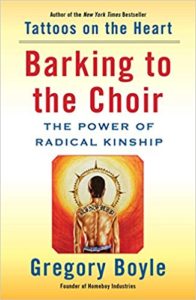 Barking to the Choir: The Power of Radical Kinship Gregory Boyle (Simon & Schuster) $26.00 I am absolutely convinced that this will go down as one of the truly beloved books of our time, certainly one of the great reads of 2007. It just released in December and I have not had time to read it yet, but I can without doubt celebrate it here, now. I hope you know Father Boyle – he has been in magazines like Sojourners and on NPR and “On Meaning” with Krista Tippet.
Barking to the Choir: The Power of Radical Kinship Gregory Boyle (Simon & Schuster) $26.00 I am absolutely convinced that this will go down as one of the truly beloved books of our time, certainly one of the great reads of 2007. It just released in December and I have not had time to read it yet, but I can without doubt celebrate it here, now. I hope you know Father Boyle – he has been in magazines like Sojourners and on NPR and “On Meaning” with Krista Tippet.
Boyle’s first wildly and widely acclaimed book was Tattoos of the Heart: The Power of Boundless Compassion which told of his work starting Homeboy Industries (a grace-based, job training ministry among gang members in South Central LA) and it is a book that many say is one of the most moving books they’ve ever read. It is a modern classic of urban studies and gang ministry. Boyle is a Jesuit Catholic priest with a big heart and a surprising amount of street savvy. Barking to the Choir is a sequel to Tattoos and continues the powerful story of his friendship with the kids and young adults in the ‘hood. and tells stories of how love has transformed them.
His writing has been called “incandescent” “jaw-dropping” and “astonishing” and Tattoos of the Heart has been called “a spiritual masterpiece” – “hope-filled and often hilarious.” Anne Lamott says “It is lovely and tough and tender beyond my ability to describe and left me in tears of both sorrow and laughter.”
Barking to the Choir is, quite simply, a book about compassion. It is about unconditional love and kindness. And it tells stories of how it all works, even among some of the hardest gangs in one of our largest urban centers. Surely, it is one of the most notable books this year.
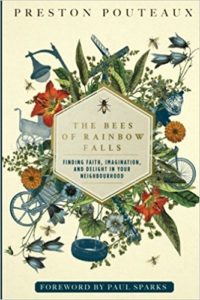 The Bees of Rainbow Falls: Finding Faith, Imagination, and Delight in Your Neighbourhood Preston Pouteaux (Urban Loft Publishers) $17.99 Well, here, too, is another great little book that I want to shout about. The intriguing, beautifully complex cover is itself award-worthy, and the story itself is, well, unlike anything I’ve seen. I don’t know about you, but sometimes we just want to celebrate a book just because it is so fresh, so new, because there is nothing like it; it’s a breath of fresh air, unexpected.
The Bees of Rainbow Falls: Finding Faith, Imagination, and Delight in Your Neighbourhood Preston Pouteaux (Urban Loft Publishers) $17.99 Well, here, too, is another great little book that I want to shout about. The intriguing, beautifully complex cover is itself award-worthy, and the story itself is, well, unlike anything I’ve seen. I don’t know about you, but sometimes we just want to celebrate a book just because it is so fresh, so new, because there is nothing like it; it’s a breath of fresh air, unexpected.
Urban Loft is a boutique, niche publisher in the Pacific Northwest that has done some very nice books about rather hip topics (urban biking) and church planting, and a marvelous book called No Home Like Place. This fits with their localist missional vision, and Paul Sparks (co-author of The New Parish) wrote a great foreword. I like very much that this book is about having a missional sense of wanting to be a blessing to one’s neighborhood.
And ya gotta love that he does it by bee keeping. Yep, missional bee keeping.
This book has been called “enchanting” and “captivating” and “charming” and “delightful” and “elegant.” But even as he tells his story, it does call us to imagine “living in our neighbourhoods in a way that transforms our whole outlook on faith, hope, and love.” Pourteaux writes about this unlikely journey and how it changed how he saw his neighbors.
As it says on the back cover, “The Bees of Rainbow Falls reminds us that we matter to our community, that goodness is found all around us, and that new life emerges out of the small and sublime.”
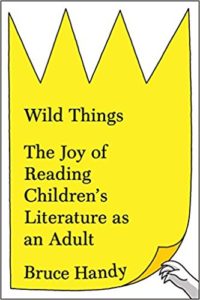 Wild Things: The Joy of Reading Children’s Literature as an Adult Bruce Handy (Simon & Schuster) $26.00 We want to mention this as a lovely, thoughtful book that deserves an award this year, too. And what a book to celebrate! It is serious, thoughtful, what might even be called literary criticism, even as it playfully explores the deeper meaning – for adults – of books as common as those by Dr. Suess and Maurice Sendak and Beatrix Potter and titles as beloved as Charlotte’s Web and Narnia. Can it be that Ramona Quimby can be as true an American icon as Tom Sawyer or jay Gatsby?
Wild Things: The Joy of Reading Children’s Literature as an Adult Bruce Handy (Simon & Schuster) $26.00 We want to mention this as a lovely, thoughtful book that deserves an award this year, too. And what a book to celebrate! It is serious, thoughtful, what might even be called literary criticism, even as it playfully explores the deeper meaning – for adults – of books as common as those by Dr. Suess and Maurice Sendak and Beatrix Potter and titles as beloved as Charlotte’s Web and Narnia. Can it be that Ramona Quimby can be as true an American icon as Tom Sawyer or jay Gatsby?
Each chapter of this good book – it’s just over 300 pages! – explores a particular author or kid’s book. It is “spirited, perceptive, and just outright funny.” It has gotten all manner of “Best of” awards, listings and starred reviews. Ann Packer calls it “wonderfully-entertaining” and Lev Grossman says it is “brilliant, revelatory, and endlessly entertaining.” What a joy to know that a book like this has found it’s following. I hope BookNotes readers and friends of Hearts & Minds will help spread the news.
This really does read like a memoir as Mr. Handy (who lives in Manhattan and has two kids and a wife who herself is a novelist) tells of his encounters taking up these classic books in his mid-adult years. He has done the research and knows a lot about the authors and the books – and anyone who loves books will be impressed to learn so much. But it is also his own story, his poignant engagement with the masterpieces he is re-reading. This is one of the great reads of 2017. Cheers!
THREE BIG WENDELL BERRY AWARDS
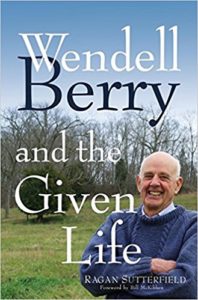 Wendell Berry and the Given Life Ragan Sutterfield (Franciscan Media) $22.99 I was so glad when this came out – I’ve read two other books by Sutterfield, including his book about land called Cultivating Reality. He is now an Episcopal priest in Texas and continues, obviously, to care about the very nature of a life well lived in peaceable sync with land and place. This is certainly one of the very best books I’ve read about Berry and for those who need an introduction – or for those who are fans and want to learn more – Wendell Berry and the Given Life is a splendid volume. Ragan covers a lot of ground in this sophisticated work and he doesn’t hold back his critique of much that is wrong with our industrialized and violent culture. He distills Berry’s prose, poems, and stories, into a dozen key points, core convictions, if you will, and it is marvelously realized.
Wendell Berry and the Given Life Ragan Sutterfield (Franciscan Media) $22.99 I was so glad when this came out – I’ve read two other books by Sutterfield, including his book about land called Cultivating Reality. He is now an Episcopal priest in Texas and continues, obviously, to care about the very nature of a life well lived in peaceable sync with land and place. This is certainly one of the very best books I’ve read about Berry and for those who need an introduction – or for those who are fans and want to learn more – Wendell Berry and the Given Life is a splendid volume. Ragan covers a lot of ground in this sophisticated work and he doesn’t hold back his critique of much that is wrong with our industrialized and violent culture. He distills Berry’s prose, poems, and stories, into a dozen key points, core convictions, if you will, and it is marvelously realized.
The foreword is wonderfully done by the eloquent and sensible Bill McKibben. Not since the 2008 Brazos Press book Wendell Berry and the Cultivation of Life: A Reader’s Guide has there been so perceptive a book about Berry; this new one, though, shows how to live it all out, in whatever place we find ourselves. Yes! This is very highly recommended, as one of the very Best Books of the year.
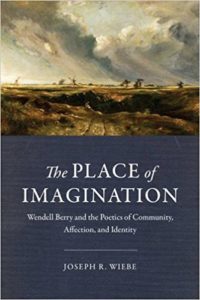 The Place of Imagination: Wendell Berry and the Poetics of Community, Affection, and Identity Joseph Wiebe (Baylor University Press) $49.95 I know this is pricey and a bit academic (okay, a lot academic.) But, still, this is a very solid book to hold, a beautiful book to read, a fine, fine resource for anyone who loves Berry. Of course many of us are drawn to Berry because of his reminder that we are to be present to our places. Whether it’s the farm in Jayber Crow or Berry’s eloquence in affirming “local” poets, or his agrarian essays talking about the literal lay of the land, his sense of place is central to his work.
The Place of Imagination: Wendell Berry and the Poetics of Community, Affection, and Identity Joseph Wiebe (Baylor University Press) $49.95 I know this is pricey and a bit academic (okay, a lot academic.) But, still, this is a very solid book to hold, a beautiful book to read, a fine, fine resource for anyone who loves Berry. Of course many of us are drawn to Berry because of his reminder that we are to be present to our places. Whether it’s the farm in Jayber Crow or Berry’s eloquence in affirming “local” poets, or his agrarian essays talking about the literal lay of the land, his sense of place is central to his work.
This fine scholar calls it “the poetics of community” and relates it to affection and identity. Let that sink in. Yep, this deserves an award, for sure. Surely one of the most important (of several) books about Berry and one of the most important books of this year, inviting us to take seriously how our own affections for our own places shapes who we are. How does imagination get formed, if not, somewhat at least, by our sense of place and our deepest loves.
And then, Wiebe (a professor of religious studies at the University of Alberta) shows how this shapes our own moral imagination. That is, we have more moral capacity to understand and care well for others when we are clear about our own place. This is rich thoughtful stuff. One might think Wiebe has been reading Jamie Smith, in fact. But, really, he’s reading Wendell Berry novels. As the publisher says:
By joining these ambassadors of Berry’s moral imagination in their fictive journeys, readers, too, can allow imagination to transform their affection, thereby restoring place as a facilitator of identity as well as hope for healed and whole communities. Loving place translates into loving people, which in turn transforms broken human narratives into restored lives rooted and ordered by their places.
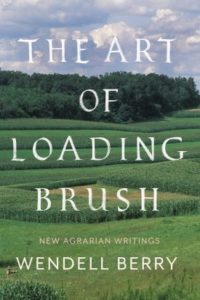 The Art of Loading Brush: New Agrarian Writings Wendell Berry (Counterpoint) $26.00 Wendell continues to work on a novel, we are told, and there are a, curiously, a teaser chapter or two here that indicate something of this forthcoming fiction. But most of this book is comprised of what he is known for, agrarian writing. That is, this really is stuff about the farming life, about land use, about animals and their care, about place and rural concerns. He speaks out against “local wastefulness and distant idealism.” He is a farmer with a big view, but always down to earth.
The Art of Loading Brush: New Agrarian Writings Wendell Berry (Counterpoint) $26.00 Wendell continues to work on a novel, we are told, and there are a, curiously, a teaser chapter or two here that indicate something of this forthcoming fiction. But most of this book is comprised of what he is known for, agrarian writing. That is, this really is stuff about the farming life, about land use, about animals and their care, about place and rural concerns. He speaks out against “local wastefulness and distant idealism.” He is a farmer with a big view, but always down to earth.
Some have said this is the best example of this kind of stuff, compiled in one volume, since his 1970s-era manifesto The Unsettling of America. Of course to do that, he engages contemporary literature, as well – he is a farmer and a poet and literary critic, after all. Booklist says of this, “About everything he loves and everything he regrets he has never written better.”
And that, my friends, surely makes this obvious as one of the very best books of the year.
AGAIN, AS WE SAID ABOVE, PLEASE STAY TUNED. THERE IS A PART THREE COMING. MORE OF THE VERY BEST… SOON, I HOPE.
BookNotes

SPECIAL
DISCOUNT
ANY ITEM MENTIONED
10% Off
order here
this takes you to the secure Hearts & Minds order form page
just tell us what you want
inquire here
if you have questions or need more information
just ask us what you want to know
Hearts & Minds 234 East Main Street Dallastown PA 17313
read@heartsandmindsbooks.com
717-246-3333
